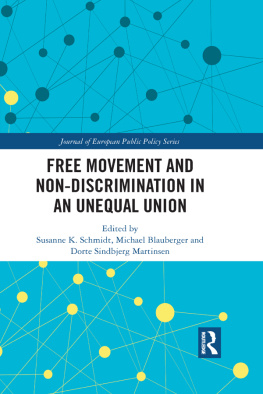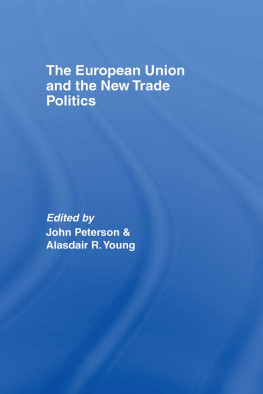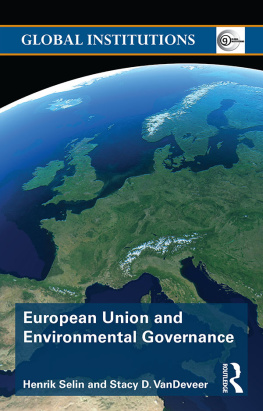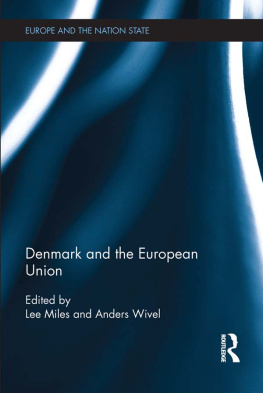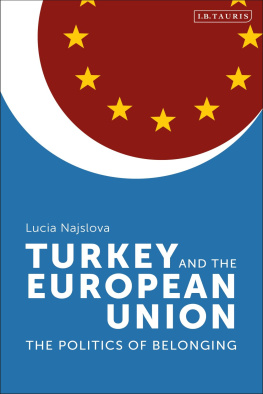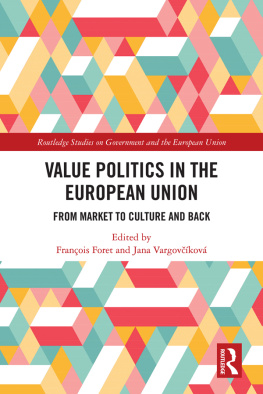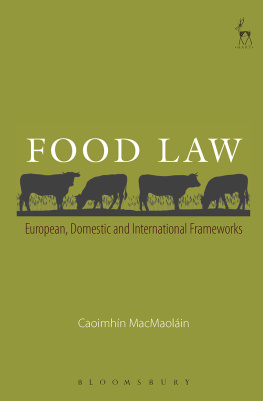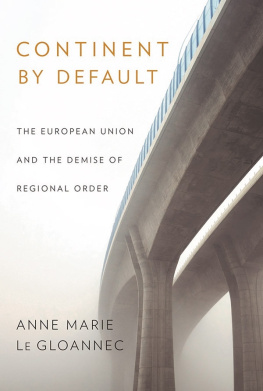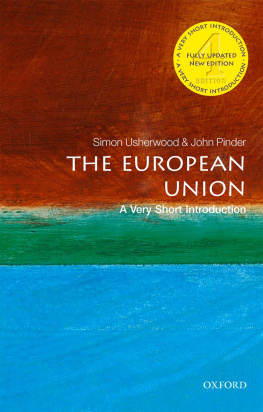The History and Politics of Free Movement within the European Union
Europes Legacy in the Modern World
Series Editors: Martti Koskenniemi and Bo Strth (University of Helsinki, Finland)
The 19th century is often described as Europes century. This series aims to explore the truth of this claim. It views Europe as a global actor and offers insights into its role in ordering the world, creating community and providing welfare in the 19th century and beyond. Volumes in the series investigate tensions between the national and the global, welfare and warfare, property and poverty. They look at how notions like democracy, populism and totalitarianism came to be intertwined and how this legacy persists in the present day world.
The series emphasizes the entanglements between the legal, the political and the economic and employs techniques and methodologies from the history of legal, political and economic thought, the history of events, and structural history. The result is a collection of works that shed new light on the role that Europes intellectual history has played in the development of the modern world.
Published
Historical Teleologies in the Modern World , Henning Trper, Dipesh Chakrabarty and Sanjay Subrahmanyam
Europes Utopias of Peace , Bo Strth
Political Reform in the Ottoman and Russian Empires , Adrian Brisku
European Modernity: A Global Approach , Bo Strth and Peter Wagner
The Contested History of Autonomy , Gerard Rosich
Caesarism in the Post-Revolutionary Age: Crisis, Populace and Leadership , Markus J. Prutsch
Orientalism, Philology, and the Illegibility of the Modern World , Henning Trueper
The History and Politics of Free Movement within the European Union: European Borders of Justice , Saila Heinikoski
Forthcoming
Social Difference in Nineteenth-Century Spanish America: An Intellectual History , Francisco A. Ortega
This book is based on research originally started in 2013, when I had no idea how politicized the issue of free movement within the European Union was about to become, because of the Brexit referendum promised by the British Conservatives and the so-called migration crisis in autumn 2015. While employing my privilege to free movement as a visiting scholar during the writing process, both phenomena became very tangible.
In autumn 2015, I happened to be on a research visit in Catania, the Italian seaport in Sicily, where people rescued from the Mediterranean Sea are brought. I could witness the migratory situation with my own eyes. During my morning runs, I could see asylum-seekers lining up at the bus station of Catania. On TV, the only programme that did not address migration was Detto Fatto, an afternoon programme for housewives. It became obvious that free movement is not the same for everyone on the European soil.
The Brexit referendum showed that not even the movement of EU citizens was accepted everywhere. On Friday, 24 June 2016, I woke up at 5 am in Trento, Northern Italy. I had signed up for a breakfast run event, which I deemed a great way to start celebrating the Midsummer Eve. When I had gone to bed, it seemed that Bremain would defeat the Brexit camp. In the early morning, I checked the news and read that the majority of Brits had voted in favour of leaving the EU. As I went outside, I saw people wearing the same blue t-shirt as me, preparing for the run. I was wondering: dont you know what has happened? I could not understand what the heck was going on.
Couple of days later, on Monday, 27 June, I was watching football in a street pizzeria. The match was England vs. Iceland and there was a Brit sitting next to me. Eventually, tiny Iceland won, against all odds, and knocked England out of the tournament. The Englishman, who had lived in Italy for ten years and spoke fluent Italian, left cursing: Ive been kicked out of Europe twice this week, he said.
In addition to these and other memorable experiences around Europe, the writing of this book has benefited from exchanges with numerous people before and after the defence of my doctoral dissertation, on which a bulk of the text is based.
I am grateful to the editors of the series, Professor Martti Koskenniemi and Professor emeritus Bo Strth, for accepting this book in the series and for their valuable and insightful comments. I also remain indebted to two anonymous reviewers. Without their comments, this book would have looked very different. I wish to express my gratitude for all the editorial help I received from Bloomsbury during the process, especially to Laura Reeves and Rhodri Mogford.
This research would not have been possible without funding. I would like to thank Kone Foundation for funding my PhD project and the project Demilitarisation in an increasingly militarised world. Sincere thanks are also in order for Wihuri Foundation, University of Turku Research Grant Fund, the Department of Philosophy, Contemporary History and Political Science at the University of Turku, the Academy of Finland-funded Centre of Excellence in Law, Identity and the European Narratives (funding decision number 312154) and the Finnish Institute of International Affairs. I am grateful for COST Action RECAST (Reappraising Intellectual Debates on Civic Rights and Democracy in Europe) for funding my Short-Term Scientific Mission in Bologna and my participation in workshops with great colleagues in inspiring environments. I would like to thank all the institutions where I have worked during these years and all my amazing co-workers, especially Director Sia Spiliopoulou kermark from the land Islands Peace Institute, with whom me and Pirjo Kleemola-Juntunen also co-authored our first international monograph, Demilitarisation and International Law in Context: The land Islands (2018).
The most sincere thanks are in order for all people who contributed to this book. First and foremost, I would like to thank Professor Henri Vogt for being my PhD supervisor and for providing me tremendous help along the way. My deepest gratitude goes to Professor Peo Hansen, who gave me invaluable comments both in the four-hour defence and in our discussions afterwards. I would also like to thank everyone who commented on my texts before the defence, including my pre-examiners and colleagues as well as all my fellow seminar and conference participants all over Europe. I regret my word limit does not allow me to list each name, but I wish to specifically express my gratitude for all participants to the Political Science research seminar at the University of Turku. Thanks for still keeping me on the list!
Many of the most important and greatest moments in writing this book, and in my life too, have taken place in Italy. I would like to thank Fulvio Attin, Marco Brunazzo and Sonia Lucarelli, respectively, for providing me the possibility to fill my scholarly and physical appetite presso le Universit di Catania, Trento e Bologna .
Most importantly, I wish to thank my family and friends. Kiitos Tatu. Mi raccomando, eh!
As always, any remaining errors are my own.
On Brexit day, 31 January 2020, Helsinki
Saila Heinikoski




